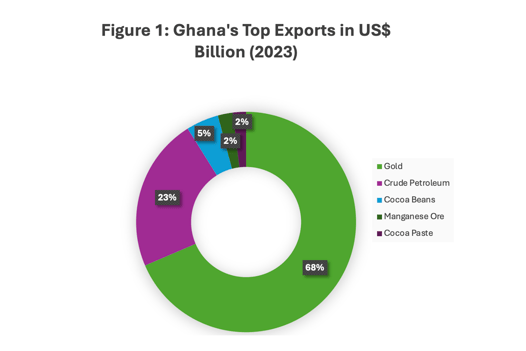Ghana's Gold Rush: Balancing Economic Growth with Sustainable Mining Practices
Explore how Ghana is transforming its gold mining industry by integrating sustainable practices, advanced technologies, and green solutions to balance economic growth with environmental responsibility.
AFRICA-CHINA BUSINESS
Harriet Comley
3/8/20257 分钟阅读
Ghana, often called the Gateway to West Africa, is a vibrant nation known for its rich history, dynamic economy, and welcoming culture. Nestled along the Gulf of Guinea, and bordered by Côte d’Ivoire, Burkina Faso and Togo, Ghana boasts diverse landscapes—from golden beaches and lush rainforests to sprawling savannas in the north. With a population of over 32 million, the country is home to a variety of ethnic groups, languages, and traditions, all contributing to its unique identity.
Economically, Ghana is one of Africa’s rising stars, driven by key industries such as agriculture, mining, oil and gas, and a rapidly growing service sector. As the world's second-largest producer of cocoa and rich in gold, Ghana has long been a powerhouse in global trade. Accra, its bustling capital, serves as a major business hub, attracting local entrepreneurs and international investors alike.
As you can see in Figure 1, gold is Ghana’s top export by a considerable amount is gold. This is no surprise seeing as Ghana is the world’s 6th largest producer of gold. It is interesting to note that Ghana exports to Switzerland ($6.49B), followed by the United Arab Emirates (UAE)($4.93B), India ($2.26B), South Africa ($1.85B), and China ($1.83B).
What is Mined in Ghana?
Gold
Ghana is the world’s 6th largest producer and 1st in Africa
Where: There are major mining operations in the Ashanti, Western and Eastern Regions
Bauxite
Bauxite is used to produce aluminium
Where: Bauxite is mined in areas such as Awaso, in the Western-North region
Manganese
Essential for steel production
Where: Primarily mined in Nsuta, Western Ghana.
Diamonds
Ghana has deposits of alluvial diamonds (ones that over millions of years have been removed from their original source because of natural erosion, and have been deposition in areas like riverbeds, coastline and the ocean floor)
Where: They are mainly found in the Eastern Region of Ghana.
Oil and Gas
Ghana has three major offshore oil production fields: Jubilee Field (discovered 2007), Tweneboa-Enyenra-Ntomme (TEN) Fields (production commenced in 2016) and Offshore Cape Three Points (OCTP) Block (production commenced in 2017).
Where: Offshore in the Gulf of Guinea
The Impact of Chinese Investment on Ghana's Mining Sector
Ghana, Africa’s top gold producer, has long been a hub for mining activities. Over the years, Chinese investment has played an increasingly significant role in shaping the country’s mining sector, particularly in large-scale gold mining and bauxite extraction. While these investments have contributed to Ghana’s economic growth, they have also sparked debates over environmental and economic impacts.
Chinese Investment in Large-Scale Gold Mining
Chinese firms, both state-owned and private, have become key players in Ghana’s gold mining industry. Companies like Shandong Gold Group have invested heavily in large-scale gold mining operations, helping to expand production and modernize mining techniques. As China remains Ghana’s largest buyer of gold, these partnerships ensure a steady flow of resources between the two nations.
Beyond direct mining operations, Chinese companies also supply mining equipment, capital, and technology to Ghanaian mining firms, improving efficiency and productivity. However, this increased involvement has raised concerns over issues such as labor rights, fair economic benefits, and illegal small-scale mining activities linked to some Chinese operators.
The Bauxite-for-Infrastructure Deal
In 2018, Ghana signed a $2 billion bauxite-for-infrastructure deal with China’s Sinohydro Corporation. Under this agreement, China is financing the construction of roads, bridges, and hospitals in exchange for access to Ghana’s bauxite reserves in Atewa Forest.
While the deal aims to improve Ghana’s infrastructure and unlock economic opportunities, it has also attracted significant opposition from environmental groups. The Atewa Forest, a critical biodiversity hotspot and source of drinking water for millions of Ghanaians, is at risk due to mining activities. Conservationists argue that the long-term environmental costs of bauxite mining in this region could outweigh the short-term economic gains.
Balancing Growth and Sustainability
Chinese investments in Ghana’s mining sector have undeniably contributed to economic expansion, job creation, and infrastructure development. However, concerns over environmental degradation, resource exploitation, and economic dependence on foreign investors remain key issues that require careful management. Striking a balance between economic growth and sustainable resource management will be crucial in determining the long-term benefits of Chinese involvement in Ghana’s mining industry.
As Ghana continues to position itself as a leading mining hub in Africa, the role of foreign investors, especially from China, will remain a critical factor in shaping the future of the sector.
China's Belt and Road Initiative (BRI)
China's Belt and Road Initiative (BRI) has significantly impacted Ghana's economy, enhancing infrastructure like the Tema Port expansion and supporting sectors such as mining, agriculture, and manufacturing. China is Ghana's largest trading partner, with increased bilateral trade and investments in key areas, including mining and energy. Notably, the China-Ghana Free Trade Agreement, launched in 2021, has facilitated smoother economic exchanges. Additionally, Chinese companies have contributed to job creation, while the expansion of educational and cultural exchanges strengthens the bilateral relationship.
China's Belt and Road Initiative (BRI) has had a major impact on Ghana's gold mining industry, bringing both benefits and challenges. In October 2024, China's Zijin Mining Group finalized a $1 billion deal to purchase the Akyem Gold Mine Project in Ghana from Newmont Corp. This move is part of China's larger strategy to expand its mining interests across Africa under the BRI, ensuring a consistent supply of gold while strengthening its economic presence on the continent.
Economic Benefits v Environmental Costs
Illegal gold mining in Ghana, particularly through "galamsey," has sparked a heated debate between economic benefits and environmental degradation. On one hand, illegal mining provides crucial economic opportunities for many Ghanaians, particularly in rural areas where employment options are scarce. It generates income for thousands of families and helps meet the increasing demand for gold, which is one of the country’s most valuable exports. Foreign nationals, particularly Chinese miners, have also been implicated in large-scale illegal operations, bringing in advanced equipment and capital. This has resulted in a boost to gold production, with some miners earning substantial profits. However, these economic benefits come at a significant environmental cost.
The environmental impacts of illegal mining are severe and widespread. Deforestation is rampant as miners’ clear large areas of forest to access gold deposits, disrupting ecosystems and contributing to biodiversity loss. Rivers and streams are contaminated with toxic chemicals like mercury and cyanide, used in the extraction process, poisoning local water sources and harming aquatic life. This pollution poses serious health risks to local communities who rely on these water bodies for drinking, cooking, and farming. Additionally, the land used for illegal mining is often left barren and degraded, making it difficult for agriculture to thrive in the affected areas. While the economic gains from illegal mining are apparent, they are often short-lived, as the environmental damage undermines long-term sustainability, affecting both the ecosystem and the livelihoods of future generations. The challenge lies in finding a balance between economic growth through mining and safeguarding Ghana’s natural resources, requiring a more sustainable and regulated approach to mining practices.
Economic Benefits v Economic Cost
The economic debate surrounding gold mining in Ghana is complex, as the sector brings substantial benefits but also poses significant long-term economic challenges. On one side, gold mining has been a major contributor to Ghana's GDP, providing jobs, foreign exchange, and revenue through taxes and exports. The industry has fueled growth in other sectors, such as services and infrastructure, while making Ghana one of Africa’s leading gold producers. However, these economic gains are increasingly overshadowed by the negative economic impacts that result from mining practices, especially illegal gold mining and the environmental consequences it brings.
Water pollution is one of the most pressing issues, with mining activities contaminating rivers and water bodies with toxic chemicals like mercury and cyanide. This pollution not only harms local communities but also threatens the long-term sustainability of Ghana’s water resources. Experts predict that by 2030, Ghana may have to start importing water due to the depletion and contamination of its local water sources, adding substantial costs to the economy. Furthermore, mining-induced pollution disrupts Ghana’s cocoa production, a sector that contributes significantly to the nation’s export revenue. Cocoa farmers face declining yields and damaged crops due to the pollution of water sources used for irrigation, pushing farmers further into poverty. Finally, illegal mining continues to drain government revenue, with estimates suggesting that Ghana loses approximately $2 billion annually due to these unregulated operations. While gold mining has driven economic growth, the environmental and social costs associated with it could undermine other crucial sectors, leading to a net loss in economic value in the long term.
The Future of Mining
Artificial Intelligence in Mining
The future of fixing Ghana's mining industry, especially in relation to illegal gold mining, may lie in the integration of AI and advanced technologies for environmental management. AI can optimize water treatment processes, such as adsorbing harmful chemicals like mercury and lead from polluted water sources in mining regions. By improving pollution control techniques like membrane filtration, ion exchange, and phytoremediation, AI-driven solutions can make these methods more efficient and cost-effective. Combining these technologies with real-time monitoring will help mitigate the severe water pollution caused by illegal mining, particularly in the Pra River Basin, while also supporting sustainable mining practices moving forward.
Want to learn more about how AI is addressing water pollution in Ghana? Check out our article, where we explore the latest academic research on innovative technologies shaping the future of water purification in mining regions. Don't miss out on the full insights! Click here.
Transitioning to a Greener Mining Future
Green gold mining in Ghana is becoming a key strategy for promoting both economic growth and environmental sustainability. In August 2024, the country launched the Cardinal Namdini mine, owned by Cardinal Resources, a subsidiary of Shandong Gold. This new mine, set to produce over 350,000 ounces of gold annually, marks Ghana's first large-scale greenfield mine in over a decade. This development is part of a broader push to enhance mineral production while addressing the environmental challenges associated with traditional mining practices.
Additionally, major players like AngloGold Ashanti are deepening their commitment to green mining, with a $2.5 billion acquisition of Centamin, aimed at expanding operations across Ghana and other parts of Africa. AngloGold Ashanti has incorporated renewable energy solutions, water treatment technologies, and sustainable mining practices, working to minimize their environmental footprint. They are focused on reducing waste, ensuring land reclamation, and preventing water contamination in their mining processes.
Newmont, a global leader in gold mining, has committed to becoming carbon neutral by 2050, integrating renewable energy and water recycling systems, and focusing on progressive reclamation plans to restore biodiversity. Similarly, B2Gold’s Fekola Mine in Mali exemplifies environmentally conscious gold mining, incorporating energy-efficient technologies and reforestation efforts. These initiatives highlight a growing trend within the Ghanaian and broader African mining sector toward adopting green mining practices. While the exact number of companies implementing such practices remains unclear, these efforts signal that the future of Ghana’s mining industry will increasingly prioritize eco-friendly solutions alongside economic growth.


